二战英文介绍
- 格式:pptx
- 大小:2.08 MB
- 文档页数:2
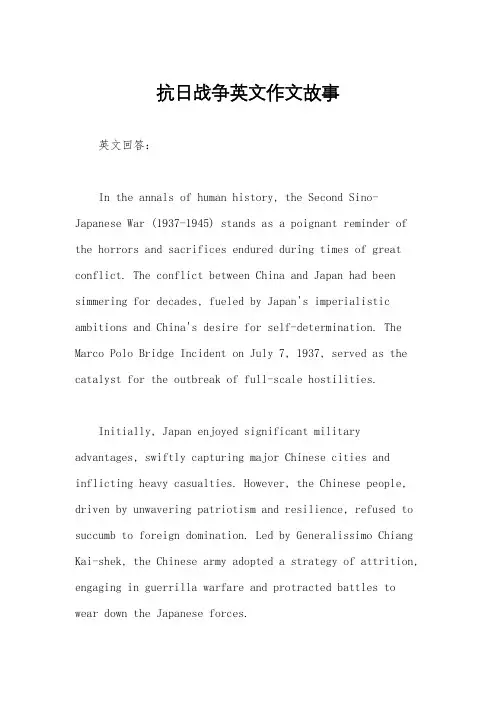
抗日战争英文作文故事英文回答:In the annals of human history, the Second Sino-Japanese War (1937-1945) stands as a poignant reminder of the horrors and sacrifices endured during times of great conflict. The conflict between China and Japan had been simmering for decades, fueled by Japan's imperialistic ambitions and China's desire for self-determination. The Marco Polo Bridge Incident on July 7, 1937, served as the catalyst for the outbreak of full-scale hostilities.Initially, Japan enjoyed significant military advantages, swiftly capturing major Chinese cities and inflicting heavy casualties. However, the Chinese people, driven by unwavering patriotism and resilience, refused to succumb to foreign domination. Led by Generalissimo Chiang Kai-shek, the Chinese army adopted a strategy of attrition, engaging in guerrilla warfare and protracted battles to wear down the Japanese forces.The war had a devastating impact on both nations. Millions of Chinese civilians perished due to massacres, starvation, and disease. Entire cities were reduced to rubble by Japanese bombings. Japan, too, suffered heavy losses, with hundreds of thousands of its soldiers killed or wounded.International condemnation of Japan's aggression mounted during the war. In December 1941, the attack on Pearl Harbor by Japan brought the United States into the conflict, and the war became part of the broader Pacific Theater of World War II. With the support of its allies, China fought valiantly, gradually turning the tide against Japan.Finally, on August 15, 1945, Japan announced its unconditional surrender following the atomic bombings of Hiroshima and Nagasaki. The war had ended, but the scars it left on both nations would take years to heal.In the aftermath of the war, China faced the dauntingtask of rebuilding its shattered economy and society. The Japanese government, confronted with the overwhelming evidence of war crimes committed by its forces, issued a formal apology and committed to making reparations to China. However, the legacy of the conflict continues to cast a shadow over relations between the two countries today.中文回答:抗日战争英文作文故事。
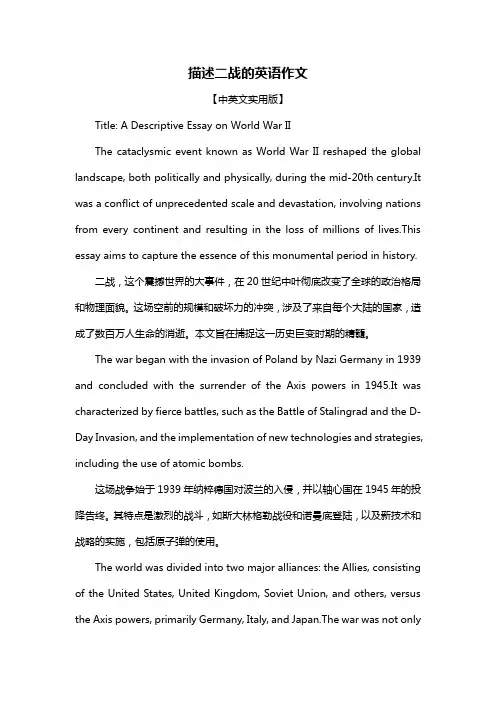
描述二战的英语作文【中英文实用版】Title: A Descriptive Essay on World War IIThe cataclysmic event known as World War II reshaped the global landscape, both politically and physically, during the mid-20th century.It was a conflict of unprecedented scale and devastation, involving nations from every continent and resulting in the loss of millions of lives.This essay aims to capture the essence of this monumental period in history.二战,这个震撼世界的大事件,在20世纪中叶彻底改变了全球的政治格局和物理面貌。
这场空前的规模和破坏力的冲突,涉及了来自每个大陆的国家,造成了数百万人生命的消逝。
本文旨在捕捉这一历史巨变时期的精髓。
The war began with the invasion of Poland by Nazi Germany in 1939 and concluded with the surrender of the Axis powers in 1945.It was characterized by fierce battles, such as the Battle of Stalingrad and the D-Day Invasion, and the implementation of new technologies and strategies, including the use of atomic bombs.这场战争始于1939年纳粹德国对波兰的入侵,并以轴心国在1945年的投降告终。
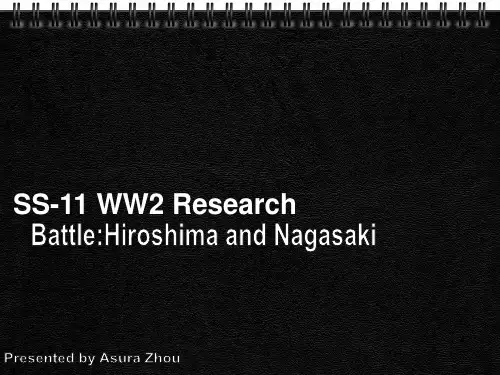
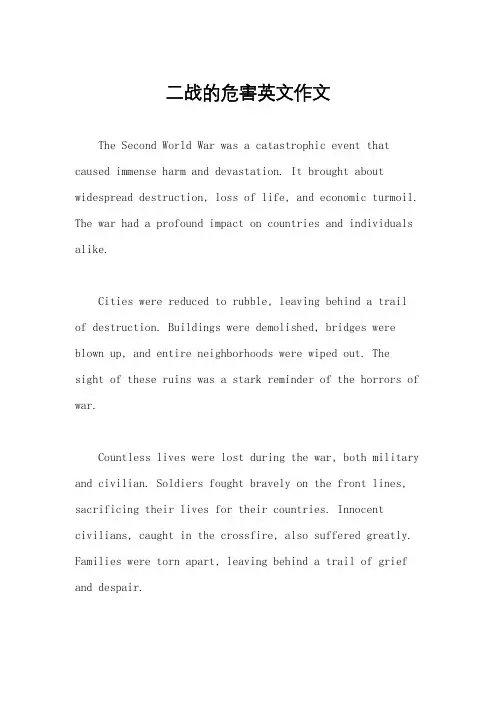
二战的危害英文作文The Second World War was a catastrophic event that caused immense harm and devastation. It brought about widespread destruction, loss of life, and economic turmoil. The war had a profound impact on countries and individuals alike.Cities were reduced to rubble, leaving behind a trail of destruction. Buildings were demolished, bridges were blown up, and entire neighborhoods were wiped out. Thesight of these ruins was a stark reminder of the horrors of war.Countless lives were lost during the war, both military and civilian. Soldiers fought bravely on the front lines, sacrificing their lives for their countries. Innocent civilians, caught in the crossfire, also suffered greatly. Families were torn apart, leaving behind a trail of grief and despair.The war also had a devastating impact on the economy. Industries were disrupted, trade routes were cut off, and resources were depleted. The cost of rebuilding was astronomical, and it took years for countries to recover from the economic aftermath of the war.The psychological impact of the war cannot be underestimated. The constant fear and uncertainty, the trauma of witnessing violence and death, took a toll on the mental well-being of individuals. Post-traumatic stress disorder became a common affliction among soldiers and civilians alike.The war also gave rise to widespread discrimination and persecution. Ethnic and religious minorities were targeted and subjected to horrific acts of violence. The Holocaust, in particular, stands as a chilling reminder of the depths of human cruelty.The war also led to the development and use of devastating weapons, such as atomic bombs. The bombings of Hiroshima and Nagasaki demonstrated the immense destructivepower of these weapons, causing unimaginable suffering and loss of life.In conclusion, the Second World War had a profound and lasting impact on the world. It brought about immense harm and devastation, leaving behind a trail of destruction, loss of life, and economic turmoil. The war's effects were felt on both a physical and psychological level, and its consequences continue to shape our world today.。
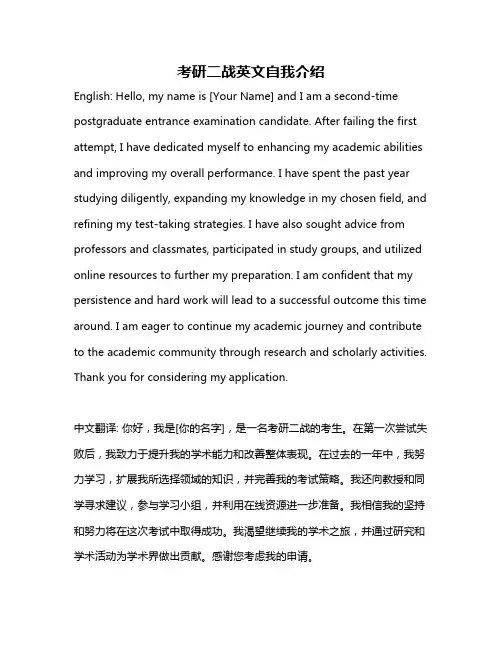
考研二战英文自我介绍English: Hello, my name is [Your Name] and I am a second-time postgraduate entrance examination candidate. After failing the first attempt, I have dedicated myself to enhancing my academic abilities and improving my overall performance. I have spent the past year studying diligently, expanding my knowledge in my chosen field, and refining my test-taking strategies. I have also sought advice from professors and classmates, participated in study groups, and utilized online resources to further my preparation. I am confident that my persistence and hard work will lead to a successful outcome this time around. I am eager to continue my academic journey and contribute to the academic community through research and scholarly activities. Thank you for considering my application.中文翻译: 你好,我是[你的名字],是一名考研二战的考生。
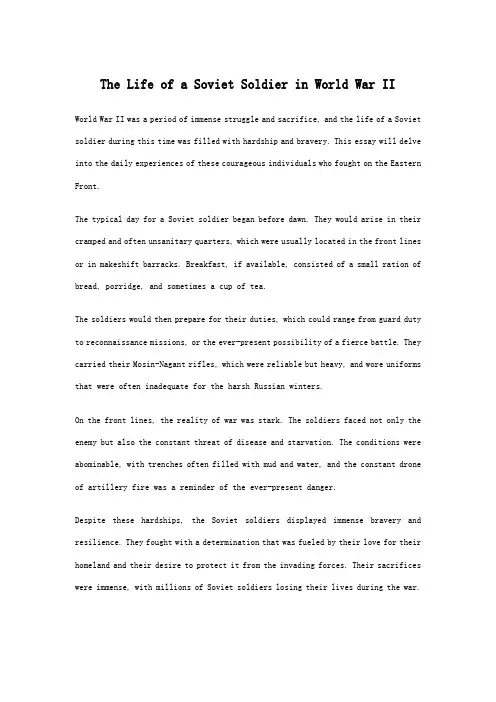
The Life of a Soviet Soldier in World War II World War II was a period of immense struggle and sacrifice, and the life of a Soviet soldier during this time was filled with hardship and bravery. This essay will delve into the daily experiences of these courageous individuals who fought on the Eastern Front.The typical day for a Soviet soldier began before dawn. They would arise in their cramped and often unsanitary quarters, which were usually located in the front lines or in makeshift barracks. Breakfast, if available, consisted of a small ration of bread, porridge, and sometimes a cup of tea.The soldiers would then prepare for their duties, which could range from guard duty to reconnaissance missions, or the ever-present possibility of a fierce battle. They carried their Mosin-Nagant rifles, which were reliable but heavy, and wore uniforms that were often inadequate for the harsh Russian winters.On the front lines, the reality of war was stark. The soldiers faced not only the enemy but also the constant threat of disease and starvation. The conditions were abominable, with trenches often filled with mud and water, and the constant drone of artillery fire was a reminder of the ever-present danger.Despite these hardships, the Soviet soldiers displayed immense bravery and resilience. They fought with a determination that was fueled by their love for their homeland and their desire to protect it from the invading forces. Their sacrifices were immense, with millions of Soviet soldiers losing their lives during the war.In conclusion, the life of a Soviet soldier in World War II was marked by immense hardship and sacrifice. Their bravery and determination played a crucial role in the ultimate victory of the Allied forces. We owe a debt of gratitude to these courageous individuals who made the ultimate sacrifice to protect their homeland and secure our freedom.。
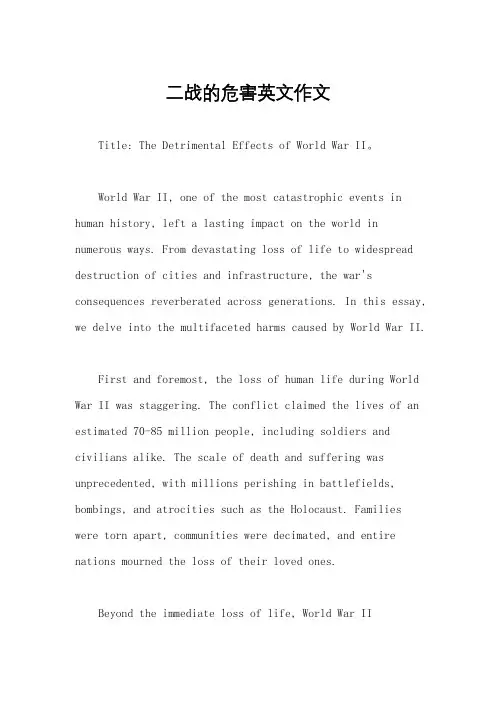
二战的危害英文作文Title: The Detrimental Effects of World War II。
World War II, one of the most catastrophic events in human history, left a lasting impact on the world in numerous ways. From devastating loss of life to widespread destruction of cities and infrastructure, the war's consequences reverberated across generations. In this essay, we delve into the multifaceted harms caused by World War II.First and foremost, the loss of human life during World War II was staggering. The conflict claimed the lives of an estimated 70-85 million people, including soldiers and civilians alike. The scale of death and suffering was unprecedented, with millions perishing in battlefields, bombings, and atrocities such as the Holocaust. Families were torn apart, communities were decimated, and entire nations mourned the loss of their loved ones.Beyond the immediate loss of life, World War IIinflicted profound psychological trauma on survivors. Soldiers returned home haunted by the horrors they witnessed on the battlefield, grappling with conditionslike post-traumatic stress disorder (PTSD) long after the war ended. Civilians, too, endured unimaginable suffering, with many experiencing displacement, starvation, and the loss of their homes and livelihoods. The psychological scars of World War II continue to affect individuals and societies to this day.Moreover, the economic impact of World War II was immense. The war drained the resources of participating nations, leading to widespread poverty, rationing, and economic instability. Infrastructure was destroyed, industries were disrupted, and millions were left unemployed in the aftermath of the conflict. The war also gave rise to unprecedented levels of government debt, which burdened future generations and hindered post-war reconstruction efforts.In addition to its human and economic toll, World War II had far-reaching geopolitical consequences. The warredrew the map of the world, leading to the collapse of empires, the emergence of new nation-states, and the division of Europe into East and West. The establishment of the United Nations and other international organizations sought to prevent future conflicts, but tensions between global powers persisted, giving rise to the Cold War and decades of proxy conflicts.Furthermore, World War II had a profound impact on cultural and societal norms. The atrocities committed during the war forced the world to confront the darkest aspects of human nature, leading to a reevaluation of moral and ethical principles. The Nuremberg Trials, for example, established the precedent that individuals could be held accountable for war crimes, regardless of their official capacity. The Holocaust, in particular, underscored the dangers of prejudice, discrimination, and hatred, prompting efforts to promote tolerance, diversity, and human rightsin the post-war era.In conclusion, World War II left an indelible mark on the world, inflicting immense human suffering, economichardship, and geopolitical upheaval. Its legacy continuesto shape our world today, reminding us of the importance of peace, cooperation, and understanding in a globalized world. As we reflect on the horrors of the past, let us strive to build a future where such devastation is never againallowed to occur.。
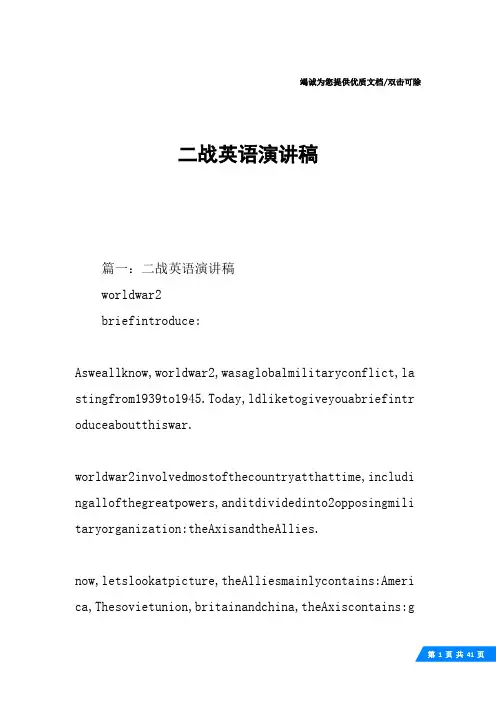
竭诚为您提供优质文档/双击可除二战英语演讲稿篇一:二战英语演讲稿worldwar2briefintroduce:Asweallknow,worldwar2,wasaglobalmilitaryconflict,la stingfrom1939to1945.Today,ldliketogiveyouabriefintr oduceaboutthiswar.worldwar2involvedmostofthecountryatthattime,includi ngallofthegreatpowers,anditdividedinto2opposingmili taryorganization:theAxisandtheAllies.now,letslookatpicture,theAlliesmainlycontains:Ameri ca,Thesovietunion,britainandchina,theAxiscontains:german,Italy,Japanandsoon.Then,letsknowabouttheleadersofmainlycountryduringth ewar.1.Adolfhitler:Thecorecharactersingermanyofworldwar2 .In1939,heagainstpolandwhichlaunchedthesecondworldw ar2.winstonchurchill:Inworldwar2heservedasprimeministeroftheunitedKingdo mfrom1940to1945andplayedaleadingrolewhoagainstgerma ndominationofeurope.3.stalin,Joseph:generalsecretaryofthecommunistpartyoftheunionofsovi etsocialistRepublics(ussR)from1922to1953,heisregard edasthedespoticruler.4.Roosevelt:,Althoughheisthedisabledperson,heisstillthegreatestl eaderofusAwhosparkedthefireofthewholecountrywithone heartnewspirit.note1:TheVersaillesTreatywasregardedasthefuseofthewar.not e2:nazi,thisnameisfullofattractive,butinfact,itisthesymbolofevil.Reason:Theoutbreakofwarhadlotsofcauses,butasfarasImconcern ed,themostimportantreasonsarethat.Inaword,duetothes eriouslyeconomiccrisis,theAxiswenttothewayoffascist .Theytriedtheirwholecountrypowerandresourcestodevel opthearmsandtoprepareforexpansion.Inthemeantime,TheAxiswerenotsatisfiedwiththeVersail lesTreatyandtheyallwantedtocontrolthewholeworld.whi le,unfortunately,theAlliesfacedtotheambitionsoftheA xisnegativelyandtheywerebusydevelopingtheeconomic.s o,afterthat,theworldwar2brokeout.process:Ineuro.breakoutInseptember,1939,germanylaunchedalighteningattackon polandwhichledbritainandFrancedeclaredwarongermany2 dayslater.Afterthat,germanycapturedFranceandsomeoth ersmallwesterneuropeancountries.Then,on1941.6.22,germanyopeningofthesecondfrontanda ttacktheussR.1.LeningradDefence:Inthenorth,thenorthernArmygroupsurroundedtheLeningr ad,itwasthesymbolofthecultureinthesoviet.Despitegre atsuffering,however,thepeopleofLeningradrefusedtosu rrender.whenfoodranout,peoplediedfromhungeranddisea se.Finally,theRedArmybrokethethree-yearsiegeofLenin gradonJanuary15,1944.Thiswaristhebloodiestbattlesin thehistoryofwarfare.2.Thebattleofmoscow:moscowisthecapitaloftheunionofsovietsocialistRepubl ics(ussR)anditisalsothelargestsovietcity.moscowwasr egardedasthepoliticalcenter,sostalinorderedthatallt heRedArmysoldiersshouldneverstepback.Thisbattlelast edforabout6month,andendedwiththevictoryofussRin1942 .01.07.3.Thebattleofstalingrad:bythesummerof1942.Inthesouth,thesouthernArmygrouppu shedeasttostalingrad,agreatindustrialcity,itwasthee conomiccentreofthesoviet.Thiswarwasamajorbattleofwo rldwarII.Duringthisbattle,thesovietgiventhegermanyA rmyaheavyblow.Afterwards,thegermancanneverleadedoff anattack.soitstheturningpointsofthewar.InAsian.Japanattackedtopearlharborin1941,12,7.ThenAmericajo inedthewar.Thebattleofsonghu:IntheAsianbattlefield.chinaplayedaveryimportantrole .shesufferedfromthemainattackofJapan,andshealsomade greatsacrificetoantifascist.class2Theturningpoints.石张磊7号normandylandings:In1944,thesecondeuropeanfrontwasop ened,britainandtheuslandedonthebeachesofnormandy.It meansgermanywilltrendtofailureinnearfuture.Finallybattles.AftertheAlliesoccupiedberlin,in1945,5,8.germanysurrendered.onAugust,1945,theusdropped2a tombombsonJapan,finally,Japanesesurrendered.Theworldwar2cametotheend.mythought:Inmyhumbleopinion,despitethenon,justtobehonest,thegermanyArmywasthemostpowerfulforc esinthattime.butAdolfhitlerhadmade3unforgivablemist akeswhichletgermanywenttofail.First,hedidnttryhisbesttobeatbritain,soheforcedtofi ghtontwofrontswhichletgermanyspentmoreresources.sec ond,hedidntovercametheLeninZiegler,sogermanyArmycou ldntsuccesstomeetwithFinland,thecountrywasattackedb ythesovietin1939,andthepowerfulnorthernArmygroupcou ldntgotosouthtosurroundthesovietArmy.Finally,themos timportantpointisthathitleradoptedapolicyofgenocide .Duetothatreason,manyenemywasforcedtodolifeanddeath struggle,thoughtheywerereluctantandhatetofight.Result:worldwar2letmorethan60millionpeoplelosetheirlivesan dgavepeopleendlesstrauma.but,intheotherside,manycou ntriesbecamesocialistordemocraticandmanycolonies(殖民地)wontheirindependence.ofcourse,inordertoavoidwarh appenagain,InApril1945,justattheendofthewar,theunit ednationsorganizationstartedinAmerica.Itisthemostim portantorganizationwhichiscommittedtomaintainingwor ldpeace.Tag:Ifyouareinterestedinworldwar2orevenhavesomedifferen tideas.Imverygladtocommunicatewithyouandtogiveyouso memoredetailsafterclass.Thankyouforlistening.篇二:关于战争英语演讲稿awordthatchangetheworldatthebottomofyourheart,cryou tfreedomabout4700yearsago,ourancestorhuangdicreatedanewnation,ineasternasia,fromtheqinunificationtotherevolutionledbysunya t-senin1911,ithasappearedatotalof83chinesedynasties。

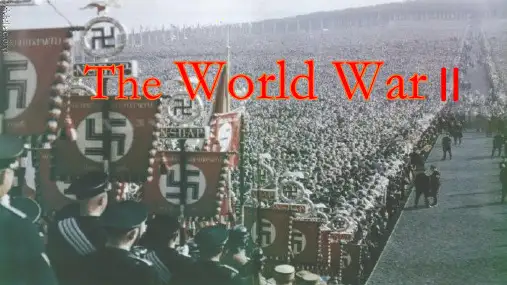
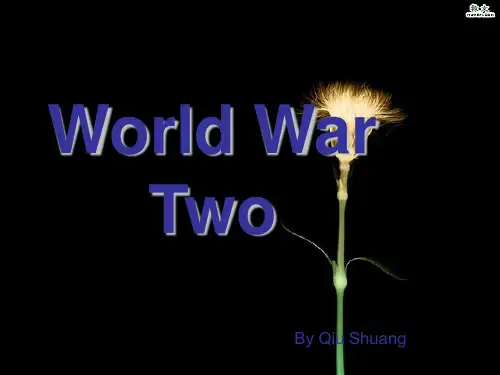
二战的英语介绍简短
简短介绍:
The Second World War, also known as WWII, was a global
war that lasted from 1939 to 1945. It involved the majority
of the world's nations, including all of the great powers,
and was the deadliest conflict in human history, causing an estimated 50 million to 85 million fatalities.
详细解释:
二战是指第二次世界大战,发生在20世纪30年代末至40年代中期。
这场战争覆盖全球,包括所有主要的大国,是人类历史上最为致
命的冲突,造成约5000万到8500万人死亡。
二战的爆发原因很复杂,其中包括国内政治不稳定、经济萧条、外交政策不当、极端主义、殖
民主义、种族主义以及领土争端等多种因素。
二战可分为两个主要阶段,即欧洲战场和太平洋战场。
欧洲战场
主要是指纳粹德国侵略欧洲和苏联,与英国、美国及苏联之间的战争。
太平洋战场主要是指日本进攻中国和其他亚洲国家,以及美国和其盟
友对日本的反击。
二战期间发生了许多重要的事件,例如纳粹德国的大屠杀、珍珠
港事件、诺曼底登陆、广岛和长崎的原子弹爆炸等。
战争结束后,出
现了一个全球性的新秩序,其中包括成立了联合国,德国和日本被迫放弃扩张政策,并开始了长达数十年的冷战时期。
美国二战历史英文作文The United States and World War II: A Pivotal Moment in HistoryThe United States' involvement in World War II was a defining chapter in the nation's history, shaping its role on the global stage and forever impacting the lives of millions. From the attack on Pearl Harbor to the ultimate victory, the American people demonstrated unwavering resilience, courage, and determination in the face of unimaginable adversity.The road to America's entry into the war was a tumultuous one. Prior to the outbreak of hostilities in Europe, the United States had sought to maintain a stance of isolationism, wary of becoming entangled in the conflicts of the Old World. However, the rapid advancement of the Axis powers and the horrific atrocities being committed could not be ignored. As the war raged on, the United States gradually shifted its position, providing aid and support to the Allied forces through programs such as the Lend-Lease Act.The pivotal moment came on December 7, 1941, when the JapaneseEmpire launched a devastating attack on the American naval base at Pearl Harbor, Hawaii. This surprise assault, which claimed the lives of over 2,400 servicemen and civilians, shattered the nation's sense of security and propelled it into the war. President Franklin D. Roosevelt's impassioned address to Congress, in which he famously declared the date "a date which will live in infamy," galvanized the American people and led to a unanimous declaration of war against Japan.The American war effort was a massive undertaking, requiring the mobilization of the entire nation. Millions of men and women answered the call to arms, leaving their civilian lives behind to serve in the military. The industrial might of the United States was harnessed to produce the vast quantities of weapons, vehicles, and supplies needed to support the troops. Women played a crucial role in this effort, filling essential positions in factories and industries previously dominated by men.The battles fought by American forces were marked by heroism, sacrifice, and strategic brilliance. From the hard-fought campaigns in the Pacific theater, where the Marines battled the Japanese in brutal island-hopping campaigns, to the decisive victories in Europe, where the Allied forces liberated the continent from the grip of Nazi tyranny, the American soldier proved to be a formidable foe.The Battle of Normandy, also known as D-Day, stands as one of the most pivotal moments of the war. On June 6, 1944, the largest amphibious invasion in history was launched, as Allied forces stormed the beaches of Normandy, France. The courageous men who waded through the surf and scaled the cliffs in the face of withering enemy fire paved the way for the liberation of Europe.The war in Europe culminated in the defeat of Nazi Germany, marked by the surrender of the Axis powers in May 1945. However, the conflict in the Pacific continued, with the United States engaged in a brutal island-hopping campaign against the Japanese Empire. The decision to employ the atomic bombs on the cities of Hiroshima and Nagasaki, while controversial, ultimately led to Japan's surrender in August 1945, bringing an end to the deadliest conflict in human history.The impact of World War II on the United States cannot be overstated. The war transformed the nation, both socially and economically. The mobilization of the workforce, the advancements in technology and industry, and the increased role of the federal government all contributed to the emergence of the United States as a global superpower. The sacrifices made by the American people, both on the battlefield and on the home front, forged a sense of national unity and pride that continues to resonate to this day.Moreover, the war had a profound impact on the lives of individual Americans. Millions of veterans returned home, many bearing the physical and emotional scars of their experiences. The GI Bill, which provided educational and housing benefits, helped these men and women reintegrate into civilian life and paved the way for the prosperity of the postwar era.The legacy of World War II continues to shape the United States, both in its foreign policy and its domestic affairs. The lessons learned, the alliances forged, and the determination displayed during the conflict have all contributed to the nation's enduring strength and influence on the world stage. As we reflect on this pivotal moment in history, we are reminded of the extraordinary resilience and bravery of the American people, who rose to the occasion and played a crucial role in the triumph of freedom over tyranny.。
IntroductionOn 1st September 1939 Germany invaded Poland. They used a new type of warfare called …Blitzkrieg‟ or …Lightening War‟. This is a war when tanks and planes are used to knock out the defences so that the defending country is easier to conquer. Two days after this happened; Britain and France declared war on Germany and the other Axis powers. It wasn‟t until 7th December 1941, after a surprise attack by Japan, that destroyed most of America‟s navy whilst it was still at Pearl Harbour that America joined the war to help Britain and France. Also in the war was the Soviet Union under the control of Stalin. On 6th June 1944 the Allies Invaded France in a massive attack and by 2nd September 1945 the Allies had won the war.Turning PointsDunkirkThe rapid defeat of the Allies in France in 1940 came as a great shock to many people, not least the British Expeditionary Force. The Germans forced the British troops out of Belgium. Most of the troops fell back onto the beaches of Dunkirk between May 29th and June 4th 1940. The Royal Navy did not have enough ships to risk a lone rescue so they called upon the British public for help. Anyone who had a vessel capable of sailing across the channel was asked to come forward to help Britain in her …hour of need‟ The re was a massive response. The Makeshift navy was called the “Skylark Navy”. All together it took 7 days to complete the evacuation. Because the operation had to be done with such speed, guns and heavy fortifications had to be left behind. This cost lots of money but saved lives. Even though the defeat in France was a disaster, the event of saving the British troops boosted moral and made people believe that the operation was a great British success. The soldiers that had been rescued from Dunkirk were bitter towards the Nazis and this proved useful during the D-Day landings.Battle of BritainGermanys invasion of Britain could not succeed if the Luftwaffe did not have supremacy in the air. On 14th August 1940 the Luftwaffe launched an attack on British Bomber Command. In two weeks of air fighting, one quarter of British pilots were killed or badly injured. For 53 nights they came every night. On 7th September 1940 the Luftwaffe started bombing Cities. This was a fatal mistake. It gave the RAF time to regroup, repair airfields and train new pilots. This is probably what cost Germany the war. On 15th September 1940 the German air force came by daylight. Also, at this time there was a lot of propaganda going on to boost British citizens moral. People were asked to donate scrap metal for new planes. This metal would just have been dumped though, because metal was plentiful, pilots were not. On many radio broadcasts it was reported that more German planes were shot down than actually were. In some cases three or four times as many. The Britain won the Battle of Britain for a few reasons; the Allied planes, Spitfire and Hurricane easily outmatched the Luftwaffe‟s fighters. Also, the British pilots were highly trained and very efficient, they were ready to take of at a moments notice. At the height of the battle, they would be fighting practically all day. Just landing for fuel and ammunition.Battle of the AtlanticBecause Britain is an island, her supplies mainly brought in from abroad. This meant that Hitlercould cut off the supplies by bombing supply ships that were heading for British ports. Because Hitler had already gained control of most of the supply counties all he needed to do was to stop the Americans. He used a type of submarine called a U-boat. These were fairly heavily armed and could easily sink ships. To protect the ships from these, U-boats American ships would travel close together in convoys. American and British destroyers would surround these convoys, making it hard for U-boats to destroy and entire convoy and get home without damage. The battles were so frequent and hard to win that in 1941, 1299 allied ships were sunk (Six times as many as could be replaced). Only 87 German U-boats were sunk. To the Germans this was nothing. By July 1942 they were being launched at a rate of 30 per month. To cope with this new threat from U-boats, a new radar system was fitted to destroyers so that depth charges could be deployed in the correct area of sea. Radar systems were also fitted to planes so that they could seek-out and destroy U-boats whilst they were recharging their batteries. So that German U-boats could contact each other secretly, a new code was formed. This code was the Enigma code. Two Enigma machines were needed to encode and decode. This was very effective until one enigma machine and cipher documents were captured by the HMS Griffin, unharmed in May 1940. Thanks to this, the newly formed, ‟convoy‟ system of travel and the code-breakers of Bletchley park, the German U-boats were no longer as good a weapon as they were at the start of the warD-DayOn 6th June 6,500 vessels landed over 130,000 men on five Normandy beaches: Utah, Omaha, Gold, Juno and Sword. 12,000 aircraft ensured air superiority. They bombed German defences and provided cover. On Utah beach 23,000 troops were landed at a cost of 197 casualties. However, on Omaha beach the landing was significantly harder, meeting with fierce German resistance, there were 4,649 American casualties. Overall, however, the landings caught the Germans by surprise and they were unable to counter-attack with the necessary speed and strength. Once the allied troops had destroyed the German defences they were free to bring new troops, machines and supplies over the channel and into Normandy. By the end of June, Eisenhower had 850,000 men and 150,000 vehicles ashore in Normandy. Fuel would have been a major problem for the allies, but thanks to the idea of piping oil straight from America, a pipeline had been built under the Atlantic Ocean. This was hard to destroy and so it was a success.In the weeks following the landings however, the narrow lanes and thick hedgerows of the French countryside slowed Allied progress considerably. Never the less in August Paris was liberated.EvacuationDue to the threat of war in 1939, women, children and old people were moved out of high-risk areas of Britain such as industrial areas and areas with a high population. In 1939 approximately 1,125,000 people were evacuated. This was a precaution and was not necessary. No direct action was taken against Britain by Germany. Most of the evacuees were transported back to their homes. However in August 1940, the war took a turn for the worse. The number evacuees rose to about 1,300,000. Life for evacuees was difficult. Most lived with people who didn‟t understand them. Some got to live with rich people and had a nice few years but most didn‟t. They were separated from their parents, not knowing if they were dead or alive. Many Mothers, children had diseases such as Vermin or Scabies, (see source). The evacuees where chosen by families, like at an auction.Each evacuee had a label saying where they were from and what medical conditions they had. This was horrible for most and “I'll take that one” became etched on the memory of our e vacuees.。
二战给人类带来的灾难作文英文回答:The Second World War brought immense devastation and suffering to humanity. It was a global conflict that lasted from 1939 to 1945, involving many countries and resulting in an estimated 70-85 million deaths. The war was characterized by widespread destruction, loss of life, and the use of new and devastating weapons.One of the major consequences of the war was the immense loss of life. Millions of soldiers and civilians were killed in the fighting, with many more being injured or displaced. Entire cities were reduced to rubble, and countless families were torn apart. The war also saw the rise of genocide, with the Holocaust being one of the most horrific examples. The Nazi regime systematically murdered six million Jews, along with millions of other minority groups.The war also brought about significant economic and social consequences. Many countries experienced severe economic downturns, with industries and infrastructure being destroyed. The war effort required vast resources, leading to shortages and rationing of essential goods. The social fabric of societies was also deeply affected, as people had to endure hardships and make sacrifices for the sake of the war.Furthermore, the war introduced new and devastating weapons that caused immense suffering. The atomic bombings of Hiroshima and Nagasaki by the United States resulted in the deaths of over 200,000 people, and the long-term effects of radiation continue to impact generations. The war also saw the use of chemical weapons, such as the gas chambers in Nazi concentration camps, which caused excruciating pain and suffering.中文回答:二战给人类带来了巨大的灾难。
二战历史资料英文下面是店铺为大家整理的一些关于“二战历史资料英文”的资料,供大家参阅。
二战英文历史资料World War II, or the Second World War(often abbreviated WWII or WW2), was a global military conflict which involved a majority of the world's nations, including all of the great powers,organized into two opposing military alliances: the Allies and the Axis. The war involved the mobilisation of over 100 million military personnel, making it the most widespread war in history. In a state of "total war", the major participants placed their complete economic, industrial, and scientific capabilities at the service of the war effort, erasing the distinction between civilian and military resources. Over seventy million people, the majority of whom were civilians, were killed, making it the deadliest conflict in human history.The start of the war is generally held to be in September 1st 1939 with the German invasion of Poland and subsequent declarations of war on Germany by most of the countries in the British Commonwealth and France.Many belligerents were at war before or after this date, during a period which spanned from 1937 to 1941, as a result of other events. Amongst these main events are the Marco Polo Bridge Incident (fought between Nationalist China and Japan), the start of Operation Barbarossa (the Nazi invasion of the Soviet Union), and the attacks on Pearl Harbor and British and Dutch colonies in South East Asia.After the war ended in 1945, the Soviet Union and the United States emerged as the world's superpowers. This set the stage for the Cold War, which lasted for the next 45 years. The UnitedNations was formed in the hope of preventing another such conflict. The acceptance of the right to self-determination accelerated decolonization movements in Asia and Africa, while Western Europe itself began moving toward integration.。
关于二战的英文诗歌English:The Second World War, a time of devastation and loss, has provided fuel for many poetic expressions. Poets from various countries have used their art to capture the trials and tribulations of war, the bravery and sacrifice of soldiers, and the impact of conflict on individuals and societies. Some poets, like Wilfred Owen and Siegfried Sassoon, who experienced the horrors of the Great War, wrote powerful and emotive poems that vividly portrayed the harsh realities of combat. Others, like Auden and Dylan Thomas, used their poetry to explore the broader themes of humanity, violence, and the destruction of war. The Second World War inspired a new wave of poetry that delved into the collective trauma and suffering experienced by people around the world, offering a poignant and lasting testament to the impact of that dark period in history.中文翻译:第二次世界大战,是一段毁灭和损失的时期,这段时期提供了许多诗歌表达的素材。